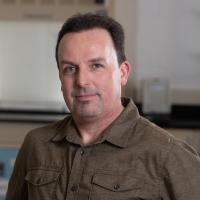 Life is complex, diverse and thoroughly mixed. Our analytical chemists develop ways to identify and quantify specific chemical components within the whole. Through qualitative “What is it?” and quantitative “How much is it?” inquiry, analytical chemists promote understanding of the relationship of specific analyte(s) to the properties of the sample as a whole. They can then gain a deeper understanding of complex phenomena, such as a diagnosis of cystic fibrosis.
Life is complex, diverse and thoroughly mixed. Our analytical chemists develop ways to identify and quantify specific chemical components within the whole. Through qualitative “What is it?” and quantitative “How much is it?” inquiry, analytical chemists promote understanding of the relationship of specific analyte(s) to the properties of the sample as a whole. They can then gain a deeper understanding of complex phenomena, such as a diagnosis of cystic fibrosis.
Analytical chemistry techniques can be applied to a myriad of fields including environmental chemistry, astrochemistry, pharmaceutical science, forensics, clinical chemistry and biomedical sciences. McMaster’s collaborative approach brings together experts from across disciplines to further knowledge using our state-of-the-art facilities.
Areas of specialty include:
- Pharmaceutical and biomedical science
- Clinical chemistry
- Advanced spectroscopies and methods development
- Forensics
Our Researchers
John Brennan
Professor, Canada Research Chair in Point-of-Care Diagnostics

John Brennan
Professor, Canada Research Chair in Point-of-Care Diagnostics
Philip Britz-McKibbin
Professor
Research focuses on: Bioanalytical chemistry; metabolomics; exposomics; biomarker discovery; clinical biochemistry; capillary electrophoresis; mass spectrometry; chemometrics; bimolecular interactions; drug screening; newborn screening; population health; nutrition; precision health
Giuseppe Melacini
Professor and Chair
Research focuses on: Pre-clinical molecular pharmacology of neurodegenerative diseases and cancer; intrinsically unstructured amyloidogenic proteins: protein kinases & signaling; functional protein dynamics and allosteric regulation; Nuclear Magnetic Resonance (NMR)
Jose Moran-Mirabal
Professor, University Scholar, Associate Chair (Research)
Research focuses on:Micro- and nanostructured materials fabrication and applications; nanocellulose surface chemistry; 3D printing; biosensors; super-resolution fluorescence microscopy, biomolecular interactions

Jose Moran-Mirabal
Professor, University Scholar, Associate Chair (Research)
Joseph Okeme
Assistant Professor
Our research program aims to use novel methods to understand how chemical exposure and other environmental factors influence human and ecosystem health. Our areas of investigation include:
- Development of novel analytical methods and physical and chemical databases
- Design and development of novel passive sampling and modelling methods
- Application of novel methods and databases in human and ecosystem studies
Sarah Styler
Assistant Professor, Canada Research Chair in Atmospheric Chemistry
Dr. Styler leads the P.A.R.T.I.C.L.E.S. (pesticides, art, road dust, traffic, interdisciplinary, combustion, light, equity, surfaces) research group, which currently consists of five excellent graduate students, one stellar undergraduate trainee, and one fantastic postdoctoral researcher.
As our name suggests, we are interested in a wide range of environmentally related topics:
- chemistry on atmospheric surfaces, including desert/urban dust, wildfire particulate matter, urban surfaces, and cultural heritage objects;
- air quality, climate, and health impacts of atmospheric processes;
- pollutant transformations in complex environmental matrices;
- interdisciplinary engagement (e.g., high-throughput reactor design, art conservation science);
- environmental justice (e.g., collaboration with community partners to identify disparities in pollutant exposure)
We are always looking for enthusiastic undergraduate and graduate students to join our team. As of Spring 2022, please contact us through the standardized form on the P.A.R.T.I.C.L.E.S. website if you are interested in finding out more about the work we do and how it might fit with your own interests and goals.

Sarah Styler
Assistant Professor, Canada Research Chair in Atmospheric Chemistry
John Brennan
Professor, Canada Research Chair in Point-of-Care Diagnostics
John Brennan
Professor, Canada Research Chair in Point-of-Care Diagnostics
Philip Britz-McKibbin
Professor
Research focuses on: Bioanalytical chemistry; metabolomics; exposomics; biomarker discovery; clinical biochemistry; capillary electrophoresis; mass spectrometry; chemometrics; bimolecular interactions; drug screening; newborn screening; population health; nutrition; precision health
Philip Britz-McKibbin
Professor
Research focuses on: Bioanalytical chemistry; metabolomics; exposomics; biomarker discovery; clinical biochemistry; capillary electrophoresis; mass spectrometry; chemometrics; bimolecular interactions; drug screening; newborn screening; population health; nutrition; precision health
Giuseppe Melacini
Professor and Chair
Research focuses on: Pre-clinical molecular pharmacology of neurodegenerative diseases and cancer; intrinsically unstructured amyloidogenic proteins: protein kinases & signaling; functional protein dynamics and allosteric regulation; Nuclear Magnetic Resonance (NMR)
Giuseppe Melacini
Professor and Chair
Research focuses on: Pre-clinical molecular pharmacology of neurodegenerative diseases and cancer; intrinsically unstructured amyloidogenic proteins: protein kinases & signaling; functional protein dynamics and allosteric regulation; Nuclear Magnetic Resonance (NMR)
Jose Moran-Mirabal
Professor, University Scholar, Associate Chair (Research)
Research focuses on:Micro- and nanostructured materials fabrication and applications; nanocellulose surface chemistry; 3D printing; biosensors; super-resolution fluorescence microscopy, biomolecular interactions
Jose Moran-Mirabal
Professor, University Scholar, Associate Chair (Research)
Research focuses on:Micro- and nanostructured materials fabrication and applications; nanocellulose surface chemistry; 3D printing; biosensors; super-resolution fluorescence microscopy, biomolecular interactions
Joseph Okeme
Assistant Professor
Our research program aims to use novel methods to understand how chemical exposure and other environmental factors influence human and ecosystem health. Our areas of investigation include:
- Development of novel analytical methods and physical and chemical databases
- Design and development of novel passive sampling and modelling methods
- Application of novel methods and databases in human and ecosystem studies
Joseph Okeme
Assistant Professor
Our research program aims to use novel methods to understand how chemical exposure and other environmental factors influence human and ecosystem health. Our areas of investigation include:
- Development of novel analytical methods and physical and chemical databases
- Design and development of novel passive sampling and modelling methods
- Application of novel methods and databases in human and ecosystem studies
Sarah Styler
Assistant Professor, Canada Research Chair in Atmospheric Chemistry
Dr. Styler leads the P.A.R.T.I.C.L.E.S. (pesticides, art, road dust, traffic, interdisciplinary, combustion, light, equity, surfaces) research group, which currently consists of five excellent graduate students, one stellar undergraduate trainee, and one fantastic postdoctoral researcher.
As our name suggests, we are interested in a wide range of environmentally related topics:
- chemistry on atmospheric surfaces, including desert/urban dust, wildfire particulate matter, urban surfaces, and cultural heritage objects;
- air quality, climate, and health impacts of atmospheric processes;
- pollutant transformations in complex environmental matrices;
- interdisciplinary engagement (e.g., high-throughput reactor design, art conservation science);
- environmental justice (e.g., collaboration with community partners to identify disparities in pollutant exposure)
We are always looking for enthusiastic undergraduate and graduate students to join our team. As of Spring 2022, please contact us through the standardized form on the P.A.R.T.I.C.L.E.S. website if you are interested in finding out more about the work we do and how it might fit with your own interests and goals.
Sarah Styler
Assistant Professor, Canada Research Chair in Atmospheric Chemistry
Dr. Styler leads the P.A.R.T.I.C.L.E.S. (pesticides, art, road dust, traffic, interdisciplinary, combustion, light, equity, surfaces) research group, which currently consists of five excellent graduate students, one stellar undergraduate trainee, and one fantastic postdoctoral researcher.
As our name suggests, we are interested in a wide range of environmentally related topics:
- chemistry on atmospheric surfaces, including desert/urban dust, wildfire particulate matter, urban surfaces, and cultural heritage objects;
- air quality, climate, and health impacts of atmospheric processes;
- pollutant transformations in complex environmental matrices;
- interdisciplinary engagement (e.g., high-throughput reactor design, art conservation science);
- environmental justice (e.g., collaboration with community partners to identify disparities in pollutant exposure)
We are always looking for enthusiastic undergraduate and graduate students to join our team. As of Spring 2022, please contact us through the standardized form on the P.A.R.T.I.C.L.E.S. website if you are interested in finding out more about the work we do and how it might fit with your own interests and goals.



